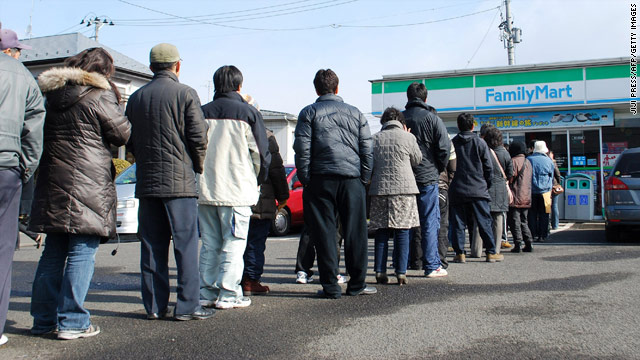 These are my Twitters following the Japan quake:
These are my Twitters following the Japan quake:Kudos to the Japanese. Unlike after disasters in the U.S. and other countries, there's been no looting and no rioting. Discipline is key to success.
Note: The picture above is of residents of Sendai, the city suffering the most damage, waiting in line at a convenience store, following the earthquake and tsunami.
Poor Japan, victim of nuclear bombs at Hiroshima and Nagasaki, now facing possible nuclear plant meltdown.
Could there be a God worth praying to if s/he wouldn't stop disasters like the Japan quake/tsunami/nuclear threat, or billions, including infants, dying of excruciating diseases?
Luck is so much more important than we acknowledge. The 40-year old Fukushima nuclear power plant was scheduled for closure in 2 weeks!
It appears the meltdown will be only partial, with the radiation remaining in the containment structure...Let's hope
(Note : two items have been deleted from an earlier version to reflect new facts.
Buy on bad news: I plan to buy SHAW, which builds nuclear plants. I believe Fukushima will increase interest in new-generation, even safer plants. My plan: It has dropped 19% in the first hours the stock market opened. I will wait until SHAW rises 10 percent. That would give me sufficient optimism that downtrend is reversing.
Update: I bought 100 shares at 31.69 after it rose 10% above its low of 27.60. It subsequently rose to 34. There's been more bad news so it's back down to 31.51. I'll keep watching it. When it rises 10% above a more recent low, I'll buy more. Of course, there's a possibility that Fukushima will cause a decade-long slowdown in the nuclear industry. That's why the price has dropped 25% in a week, but I predict that, long-term, there will be much more nuclear building--of course, with super safe (and therefore more expensive and profitable to Shaw) designs. Solar, wind, etc., just can't produce enough energy. And fossil-based fuels are running out, bad for the environment, and make us dependent on the Middle East. Safely located, very safely designed nuclear is going to be key to our energy future. And, believing in the criticality of buying good stocks on bad news, I believe that buying SHAW when it shows early signs of recovery is wise. A perhaps less risky alternative is to similarly buy top-quality Japan stocks: e.g., Toyota, Sony.









7 comments:
Marty, technically TMI suffered a partial meltdown, not a total - there was no lava burrowing it way to China as some would believe. As soon as the SCRAM takes place the reaction stops. The 6" thick containment vessel was only damaged by 5/8" at its worst point in the interior. TMI was not a disaster, it was an engineering success. The design did exactly what it was supposed to do in a worst case scenario. Too bad the numbskulls at the NRC made it worse than it was. As you may know, Peter Bradford, an NRC commissioner at the time, is now a rabid anti-nuke working for UCS.
The fact is, right now, we don't know the full analysis of the control rods a Fukushima but they do have it under control. For a nice writeup by a Dr. at MIT look here:
https://morgsatlarge.wordpress.com/2011/03/13/why-i-am-not-worried-about-japans-nuclear-reactors/
It's a shame on the media that the nuclear story became the dominant story of this tragedy. Journalism has gone into the dumpster on this one.
How is this different than what happened in Hurricane Katrina?
The explosion is a very very bad sign. They are claiming that they don't know if the the reactor core has been damaged. That unfortunat¬ely isn't a true statement they know perfectly well it has been breached. They have announced elevated levels of Cesium in the air. They are talking about "radiation leakage". That is misleading¬,Cesium 135 and 137 are isotopes that are byproducts of the fission reactor using
Uranium 235 a a primary fuel. Cesium isotopes can only come from the reactor core which means it has been breached. In a best case they are deliberate¬ly venting the reactor vessel to try and keep the amping control rods from collapsing¬.
During the 1990s I owned and operated spring & summer 'short term home stay/English study programs' for groups from Asia, primarily Japan, and Europe totaling about 1500 students per year. We characterized several nationality groups as high risk for 'host community burn out,' Japanese students on the other hand were overwhelmingly appreciated by American host communities for their patience, politeness, and deference to local custom and host rules. Japanese students (ranging from middle school to college age) were responsive to program guidelines, and were collectively punctual on group outings. Japanese culture is homogeneous and patently ethnocentric. Japanese do not 'celebrate diversity' and have not suffered, what Germany's Angela Merkel refers to as 'the failure of multiculturism.' Here HERE!!!
Well, Mr. Ribeiro, the catastrophe is not measured by death, but the overall impact on the environment. The emergency scenarios were not expecting the energy blackout. With no power, they had no chance to cool the core, so they started to pump sea water to cool it off, but sea water is not purified with a lot of chlorine which in fact will cause a corrosion in stainless steel piping!
"Poor Japan, victim of nuclear bombs at Hiroshima and Nagasaki"
There are actually strong arguments that, given the situation, the US did the right thing by bombing Hiroshima & Nagasaki. I wish it wouldn't have come to that but doing so ended up saving lives. And they even refused to surrender after the bomb was dropped on Hiroshima. Not very intelligent.
Who needs men, anyways?
http://mangans.blogspot.com/2011/03/men-who-needs-em.html
Post a Comment